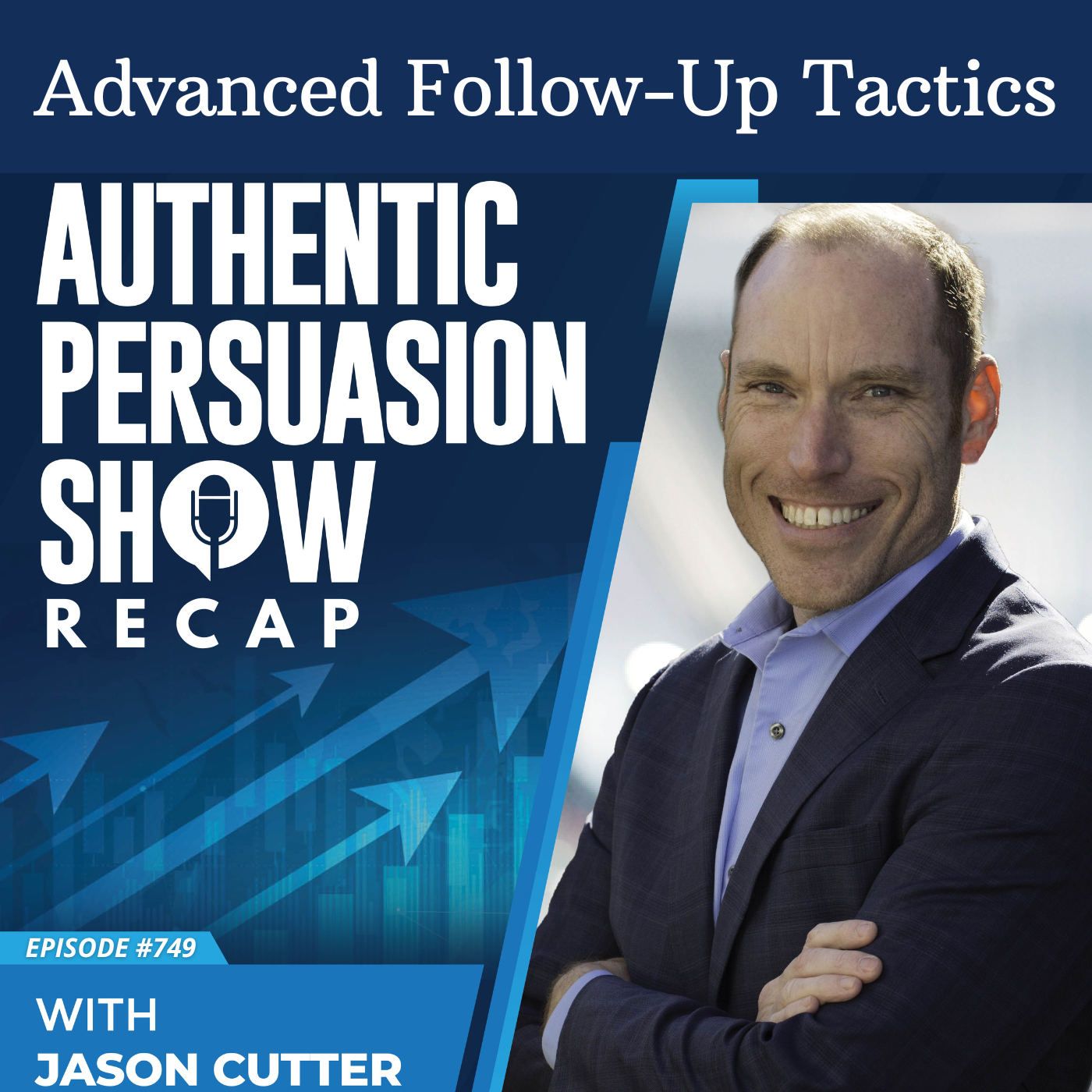Episode Transcript
Jason [00:00:00]:
This is the authentic persuasion show. Hey, there. What's going on? This is episode 630 of the authentic persuasion show. One of the topics that comes up a lot that I hear from sales leaders, sales trainers, experts, air quotes, gurus, air quotes. And it even came up in the topics of the conversations recently on the podcast with sales professors is the topic of mirroring. You already know that based on the title of this episode, here is what mirroring usually means in the context when I hear it from other people. Mirroring is, if you're talking fast, I should talk fast.
Jason [00:00:43]:
If you're talking slow, I should talk slow. If you're in person, then I want to mirror and or mimic what you're doing physically. Are you leaning back? Are you leaning forward? How are you sitting? What is your presence like? And then how are you speaking? And the goal of mirroring is to help that other person subconsciously feel like I'm relatable and I'm on their side and that we're the same. And by doing that, the goal is to build trust. So if you feel like we are the same and I'm not different than you, then it's going to move us closer to a trusting relationship. The key is that our primal part of our brain, the part that's always looking out for danger, the amygdala that's trying to keep us alive, wants to identify at all times, friend or foe. Should I like this person? Should I trust this person? Should I talk to this person, or is this person dangerous? And I should be afraid, I should be worried, and maybe I should run. So when salespeople use mirroring, their goal is to break through that instead of it's you versus me, or I'm different than you, it's you and I.
Jason [00:02:01]:
I'm on your side. I'm just like you because I talk the same way, I speak the same speed, I use some of the same words, I act the same on a video call or an in person meeting where I'm mirroring you. Now, to me, I think there's some value in that, and it's valid. Obviously, from a subconscious level, it's very valid. It is what our brain is always trying to do. I also think it can really verge on the over the line of manipulation, where I'm going to do this as a tactic to get you to trust me so that I can sell you. And of course, obviously, this is the authentic persuasion show, not the inauthentic, gross manipulation show, which means, of course, I'm not going to like that if it's something used for evil and not for good. Here's my issue, and obviously beyond if it's being used for good or evil.
Jason [00:02:54]:
And the intent behind it is, I really have an issue with mirroring because I don't think it's an effective strategy. I think if you have somebody that you're speaking with and they're talking really fast, if you talk slow, it will drive them crazy. Right. It will annoy them. I know how I get annoyed because I talk really fast and I think really fast. And when I deal with someone who's very slow, it will frustrate me and I will just feel myself getting tense. And so obviously you don't want that when you're trying to sell somebody. It brings me to examples when I was running teams in California, and California is very neutral, right.
Jason [00:03:34]:
Californians talk very neutral pace. They talk very neutral, as far as no accent, at least in my opinion, versus, let's say, the south, where people might speak a little bit slower, especially once you get out of the urban areas. And then there's a southern accent. People in the north, the Midwest, they have an accent and maybe talking a little slower, they're not in a hurry. People in Texas have an accent. Like there's all these different accents. West coast really doesn't have that. And it reminds me of running teams in California and then calling places like that.
Jason [00:04:09]:
Right. Calling somebody in Alabama and then calling somebody in New York. In New York, it's not what I found that people are rude. They're just in a hurry and they're fast paced. And that's the mode they're in. And it's like, go, go, you have 60 seconds or else. And that's it. And if it's valuable, they'll move forward.
Jason [00:04:25]:
And you have to be fast when you do that in the south, obviously, they want maybe slower conversation. They want maybe more manners. Yes, more. Yes, sir. Yes, ma'am. Kind of like old school polite manners mode. And so when you do that, it's important. But you have to be careful because there's some value in mirroring, right.
Jason [00:04:49]:
If you're calling someone from New York and they're in a hurry, then you've got to be in a hurry and you've got to go, go. But you have to be careful not to just run at that pace the whole time and hope that that's going to do it. Same thing in the south. And so the big thing that I have an issue with, with mirroring is that a lot of times people think they have to do that in order to be effective. And what you have to be careful of is sometimes that's not the right way to go. If you're mirroring what somebody's doing or how they're trying to control the conversation or what they're saying, and maybe from their personality type or the region they're in, it's important to do that. But then what happens is, let's say in the example of New York and someone who's fast paced, they're talking fast, you're talking fast, and nothing might be happening. Or you might get yourself into a trap where you don't know what to do next or say next, or you can't sustain that pace if it's a long phone call, if you're dealing with someone in the south and you're going to talk much slower and pace things out, you could end up with a really long phone call that doesn't go anywhere.
Jason [00:05:52]:
And I think that's the biggest issue with the blanket overarching kind of umbrella advice for mirroring. And the mirroring advice, again, is that you want to match what somebody else is doing. And I don't think that's good advice. I think what you have to do is understand people well enough and situations well enough where you want to mirror what they're doing and saying to a certain extent, but you're still in charge. Remember, you are the guide. You are the one who's helping them move forward. You're helping them make the right decision. And this is the big key.
Jason [00:06:32]:
Sales is leadership of that prospective customer. When it's done right, when you're selling in a proper way, that benefits them and you. And sales being service, what happens is all the leadership traits that you would read in a book and think about for great leaders is exactly what you should be doing as a salesperson. Right? You should be creating a vision and a mission and enrolling them in that mission and vision and that mission. Vision is them getting to a better place using your product or service if it's a good fit, of course. And it's about you figuring out what they want and need for themselves as an individual and then getting them on that path, moving forward and then helping them overcome obstacles for this greater mission. And again, you might be thinking, well, I'm not selling something that has a greater mission. If you're selling something, it is supposed to get them to a better place.
Jason [00:07:29]:
Could be out of pain, it could be towards gain. It's not always about pain. That's a different one for me. But it's got to get them to a better place. And so leadership is the same whether you're leading a team or leading a prospect. And here's the big thing as well, is that when you're in a leadership mindset with your prospect, you are pulling them up the mountain. You are pulling them across the finish line, right? Sometimes you're hugging them and dragging them across the finish line because you know what's best for them and they are just so stuck and having difficulties, but you are pulling them. Classic sales, old school sales is pushing people.
Jason [00:08:06]:
It's managing people. It's micromanaging the process or the prospect and wearing them down so that they don't have any other option but to comply. And so when you're mirroring, you got to be careful because now you're in manager mode and you're trying to push them and or you're letting them run the show. When you are leading somebody, you have to build trust. There has to be some level of mirroring or relationship building. It's that authentic rapport that you're building and using empathy in your discovery process. And then what happens is you're leading them and you're pulling them and you can't pull somebody along. If you are just trying to copy and mirror what they do all the time, it doesn't work.
Jason [00:08:50]:
Again, I've seen so many people from California call somebody in the south and they're having a great conversation and the tone is lower and the pace is slower and it's just this casual, good conversation that literally goes nowhere because the salesperson is still not in charge and not leading the process. They're just having a good conversation and really letting the prospective customer run the show because they're just trying to copy what the prospect is doing. And so be careful of that. If you hear mirroring, think about it. Am I mirroring or should I be mirroring what they say and do all the time and make sure that I do that as a mode to get them to trust me? Or is that part of the process but then also remembering you're in charge? And so sometimes it's not about mirroring you, it's about doing what's necessary to help you move forward, which isn't to be just like you. Again, if you understand behaviors and personality types, there's some people out there that just love having fun. They are promoters. The biggest fear is missing out, and it's the classic salesperson kind of personality that would get into sales.
Jason [00:10:01]:
But when you have a customer like that, if you mirror them and it's excitement, and let's do this, and this is great. Nothing will happen because somebody's got to drive the bus to where you want to go. So remember that. Focus on it. Understand for yourself what mirroring means, how to use it effectively, how to use it with good intent, and where the balance is with going from you so that you feel like you can trust me to. I'm actually the one that's leading this, and so I'm going to do what I've got to do to help you get across the finish line.
![[630] Mirror, Mirror](https://episodes.castos.com/salesexperiencepodcast/images/1533397/Mirror-Mirror.png)


